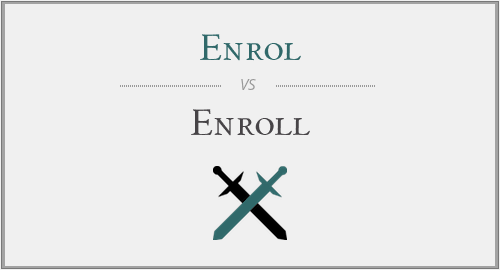Enrol vs. Enroll
There are many spelling differences between American and British English. One involves the doubling of consonants before suffixing. The British are much more likely to do so than their American counterparts, but enrol and enroll are an exception to this general rule. These two spellings are variants of the same word, but they are standard in different language communities. Continue reading to learn more about the meaning of these words, and whether you should choose enrol or enroll in your own writing.
Origin:
The word enroll originated from late Middle English (formerly also as inroll ): from Old French enroller, from en- ‘in’ + rolle ‘a roll’ (names being originally written on a roll of parchment).
Enroll as verb:
The word enroll is used as a verb in English language where it means to officially register as a member of an institution or a student on a course.
To recruit (someone) to perform a service is also referred.
A campaign to enroll more foster careers was started.
In the language of law, enroll is to enter (a deed or other document) among the rolls of a court of justice.
The endowment of religious houses cannot be measured simply by the licences enrolled in chancery.
Use of enrol:
Enrol is the standard spelling in British English, which breaks the general rule that British words carry with them an extra consonant. In many cases, such as traveling-travelling, canceled-cancelled, totaled-totalled, labeled-labelled, etc., it is the British spelling that contains the two –ll’s. But, in the case of enrolment, the standard spelling in British English only has one L.
Examples:

Procrastination, historically blamed for failure to enrol, is now the default means by which workers are funnelled into 401(k)s. [Financial Times]
Although enrolment and voting is compulsory, the penalties for non-compliance are not particularly onerous. [Australia: The State of Democracy]
Rivonia Primary School today won the right to determine the number of pupils it can enrol in a class. [Independent Online]
Use of enroll:
Enroll is a variation of the same word, applicable in all the same contexts and carrying all of the same meetings. Enroll is standard in American English, whereas enrol is standard in British English.
Examples:
In place since 2005, the GWU policy aims to provide financial certainty for families after students enroll. [Washington Post]
Just as high school enrollment increased during the 1920s, so too did enrollment at American colleges and universities. [The 1920’s]
Every March, September and November, kids and adults who enroll in the eight-week Learn to Skate beginner session receive a free pair of ice skates. [Newsday]
Enrol or enroll:
Enrol and enroll are two variants of the same word. Enrol (with one L) is standard in British English. Enroll (with two L’s) is standard in American English. Both words mean the act of signing up for services or the number of people signed up for a given service. Enroll and Dallas each have two L’s, so it might be helpful to remember that they are both American.
Remember, you can always reread this article if you need a quick refresher.




Have a discussion about this article with the community:
Report Comment
We're doing our best to make sure our content is useful, accurate and safe.
If by any chance you spot an inappropriate comment while navigating through our website please use this form to let us know, and we'll take care of it shortly.
Attachment
You need to be logged in to favorite.
Log In